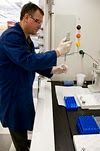This week’s Research Ethics Roundup highlights ethical issues related to clinical trials studying the psychedelics, as well as moves toward making research more efficient, innovative, and transparent.
The Trip Treatment: Author and journalist Michael Pollan reports on the reemergence of research on psychedelics. In this article from The New Yorker, Pollan shares stories of participants and their experiences in clinical trials studying the psychedelic psilocybin.
Clinical-Trial Specialist Could Be Next FDA Chief: In this article from Nature, journalist Heidi Ledford provides background on Robert Califf, who was recently appointed a deputy commissioner at the Food and Drug Administration (FDA). There is speculation that Califf will be named as the next commissioner for the FDA, following the departure of Margaret Hamburg.
Research Misconduct Often Goes Unreported In Published Studies: Ed Silverman of The Wall Street Journal discusses issues with transparency and underreported cases of research misconduct in published studies. Silverman also explores the role of the FDA in disclosing allegations of misconduct.
Young Scientists Lead the Way on Fresh Ideas: In this article from Nature, journalist Ewen Calloway discusses new research by economists Mikko Packalen and Jay Bhattacharya of the University of Waterloo in Canada that suggests that younger scientists are more innovative than older scientists.
 Reducing Animals in the Lab One Chip at a Time: Editor-in-chief of Laboratory Equipment Magazine Michelle Taylor reports on efforts to reduce the need for traditional animal studies by implementing new methods for evaluating drug safety. Highlighted in the article is Donald Ingber’s work on the development of organs-on-chip, “which allows researchers to recreate the physiological and mechanical functions of the organ, and to observe what happens in real-time.”
Reducing Animals in the Lab One Chip at a Time: Editor-in-chief of Laboratory Equipment Magazine Michelle Taylor reports on efforts to reduce the need for traditional animal studies by implementing new methods for evaluating drug safety. Highlighted in the article is Donald Ingber’s work on the development of organs-on-chip, “which allows researchers to recreate the physiological and mechanical functions of the organ, and to observe what happens in real-time.”


No comments! Be the first commenter?